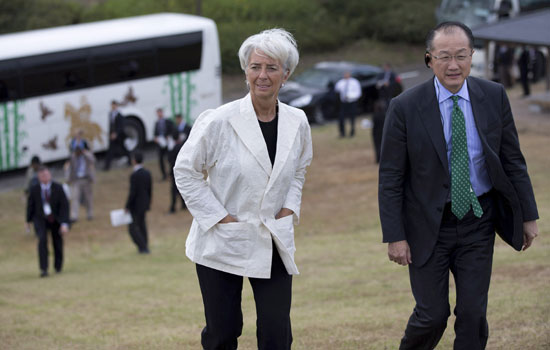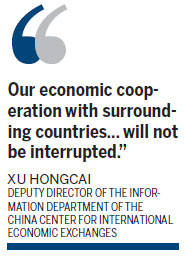
Absence seen as latest sign tension is spreading to economic relations
The Chinese central bank governor and finance minister will skip the annual meetings of the International Monetary Fund and World Bank Group that are taking place in Tokyo this week as relations between the two Asian powers remain tense.
|
 |
|
IMF Managing Director Christine Lagarde (left) and World Bank President Jim Yong Kim tour the areas hit by last year's massive earthquake and tsunami as part of the Sendai Dialogue, a disaster risk management meeting in Sendai, northern Japan, on Wednesday. The event was held before the IMF's annual meeting of world finance ministers and central bankers in Tokyo this week. [Photo/Agencies] |

The place of Zhou Xiaochuan, governor of the People's Bank of China, the central bank, will be taken by his deputy, Yi Gang, who will deliver a speech on Sunday, according to an event listing on the IMF's website.
"We were informed two days ago that Governor Zhou's schedule might require him to cancel his lecture in Tokyo," an IMF spokeswoman said.
"If Zhou is not going to attend, it is truly unfortunate as the annual meeting in Tokyo is a very important event," the Financial Times quoted Osamu Fujimura, the Japanese chief cabinet secretary, as saying.
"In any case, economic exchanges between Japan and China are very important, so we hope to smooth bilateral communications broadly."
Koriki Jojima, Japanese finance minister, who took up his position 10 days ago, said it was "regrettable" that the two men won't attend the meetings, adding that "from the global perspective, we will continue to communicate with China".
Besides Yi, the Chinese delegation to Tokyo will be led by Zhu Guangyao, vice-minister of finance, Xinhua News Agency reported on Tuesday, suggesting that Finance Minister Xie Xuren will also miss the conference.
"There might be multiple reasons for the officials' absence," said Xu Hongcai, deputy director of the Information Department of the China Center for International Economic Exchanges.
"It's not necessarily to boycott the trip to Japan, and China absolutely has no reason to abandon the current role it plays in the IMF.
"The deputy governor and vice-minister can also represent China and will perform their duties in pushing forward reforms of the international financial system, as well as expressing China's stance in dealing with the current global economic turmoil," Xu said.
Every year, the annual meetings of the IMF and the World Bank bring together central bank governors, finance ministers and senior company executives from more than 180 member economies.
It has been customary for senior Chinese finance officials to attend the meetings and take part in discussions there about the global economy.
Last year, many people paid attention to the meetings to see if China would offer to help the eurozone overcome its debt troubles. In 2010, the meetings resulted in China obtaining a greater portion of the IMF's quota subscriptions, which determine its voting power in the organization and have a bearing on its access to the fund's financial resources.
The change brought China's quota subscriptions from being equal to 3.994 percent of the total subscriptions to 6.39 percent, giving it the third-largest portion among member economies.
Zhou and Xie's absence this year came after China's four biggest State-owned banks - Industrial and Commercial Bank of China Ltd, China Construction Bank Corp, Bank of China Ltd and Agricultural Bank of China Ltd - decided to not send representatives to the Tokyo meetings.
The move was widely seen as the latest sign that the worsening tension between China and Japan was spreading to the countries' economic relations. Last month, street protests broke out in Chinese cities after Tokyo "purchased" several of the Diaoyu Islands, which are part of China's territory.
The dispute, which also led to attacks on Japanese-owned factories and stores in China, has already affected trade matters and threatened to undermine the shaky economic recovery Japan has undergone since being struck by a tsunami and nuclear disaster last year.
The number of Japanese cars sold in China plunged in September. Toyota Motor Corp reported it sold 44,100 new vehicles in the country that month, down 49 percent year-on-year. Honda Motor Co Ltd said it sold 33,931 vehicles in September, 41 percent fewer than in the same month a year ago.
Tens of thousands of Chinese tourists have canceled trips to Japan.
China is Japan's chief trading partner, and economists warn that the dispute could stymie Japan's economic growth.
Concerns have arisen that the absence of top Chinese financial officials will steal some of the conference's thunder this year and dim the world's prospects for economic recovery. Some have also said it will harm China's reputation at a time that the country is trying to have more of a say in global economic matters.
"China is a responsible country," Xu said. "Our economic cooperation with surrounding countries, which is beneficial to the world economy, will not be interrupted."
"Meanwhile, the need for China to have more votes in the IMF shouldn't be questioned either. It is already a settled matter."
Xu said the country has set 2015 as the year that it wants to have the yuan added to the IMF's Special Drawing Rights, which is an international reserve asset used to supplement the official reserves of the organization's member economies. Its value is currently set in accordance with a basket of four important international currencies that can be exchanged for freely usable currencies.
Li Daokui, a renowned professor of economics at Tsinghua University and a former adviser to the central bank, who will be in Tokyo for the IMF meetings, said the conference in the past has been a stage on which China can proclaim its ideas.
"I am not here to flatter Japan," said Li, who was scheduled to attend a debate about the role of Asia in a changing world.
"I have no interest in stimulating Japan's domestic demand in Tokyo by shopping here."
AP contributed to this story.
weitian@chinadaily.com.cn